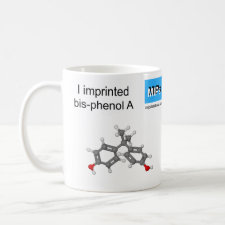
Authors: Liu YC, Wang D, Du FY, Zheng WQ, Liu ZM, Xu ZG, Hu XZ, Liu HC
Article Title: Dummy-template molecularly imprinted micro-solid-phase extraction coupled with high-performance liquid chromatography for bisphenol A determination in environmental water samples.
Publication date: 2019
Journal: Microchemical Journal
Volume: 145
Page numbers: 337-344.
DOI: 10.1016/j.microc.2018.10.054
Alternative URL: http://www.sciencedirect.com/science/article/pii/S0026265X18309408
Abstract: Four dummy templates (bisphenol B, bisphenol F, tetrabromobisphenol A, and 4-tert-butylphenol) were selected as template molecules to prepare a dummy-template molecularly imprinted polymer (MIP) for BPA analysis. The four of dummy-template MIP micro solid phase extraction bars showed good selectivity for bisphenol compounds and could be used to extract BPA present in real water samples. Furthermore, the strong bonding force between dummy-template and 4-vinyl pyridine (4-VP) was further verified by the theoretical calculations. It was found that the difference of the value coming from the system of dummy template and 4-VP was larger than that of BPA with 4-VP, revealing the strongest electronic interactions between the dummy template and 4-VP. Meanwhile, it also reveals that dummy-template MIPs are equally effective and even stronger in bonding bisphenol in complex samples. The dummy-template MIP micro solid phase extraction bars were suitable for trace BPA analysis in water samples without being affected by template leakage. The recoveries of BPA from pond water and sewage samples were 65.56-88.84% with the relative standard deviation of 1.30-8.93%. The linear range was 0.01-15 μg L-1 (r2 = 0.9998). The limit of detection was 0.003 μg L-1 (signal-to-noise ratio (S/N = 3)). The limit of quantification, which was the lowest concentration that could be quantitatively detected, was found to be 0.01 μg L-1 (S/N = 10). The proposed sample preparation method is easy, simple, and reproducible
Template and target information: dumy templates, bisphenol B, bisphenol F, tetrabromobisphenol A, 4-tert-butylphenol, bisphenol A, BPA
Author keywords: Dummy-template, molecularly imprinted polymer, Micro-solid-phase extraction, bisphenol, water samples, Recognition



Join the Society for Molecular Imprinting

New items RSS feed
Sign-up for e-mail updates:
Choose between receiving an occasional newsletter or more frequent e-mail alerts.
Click here to go to the sign-up page.
Is your name elemental or peptidic? Enter your name and find out by clicking either of the buttons below!
Other products you may like:
 MIPdatabase
MIPdatabase









